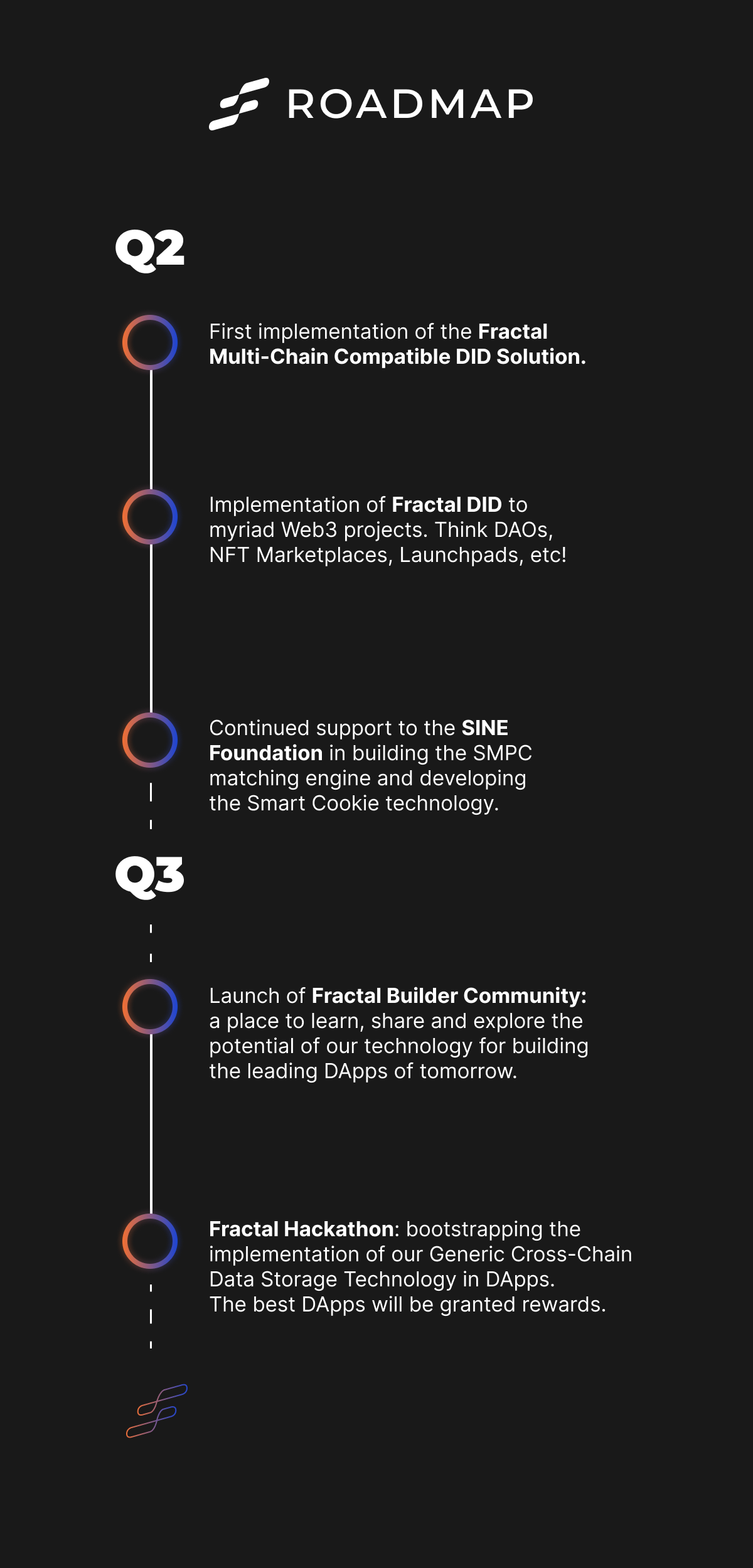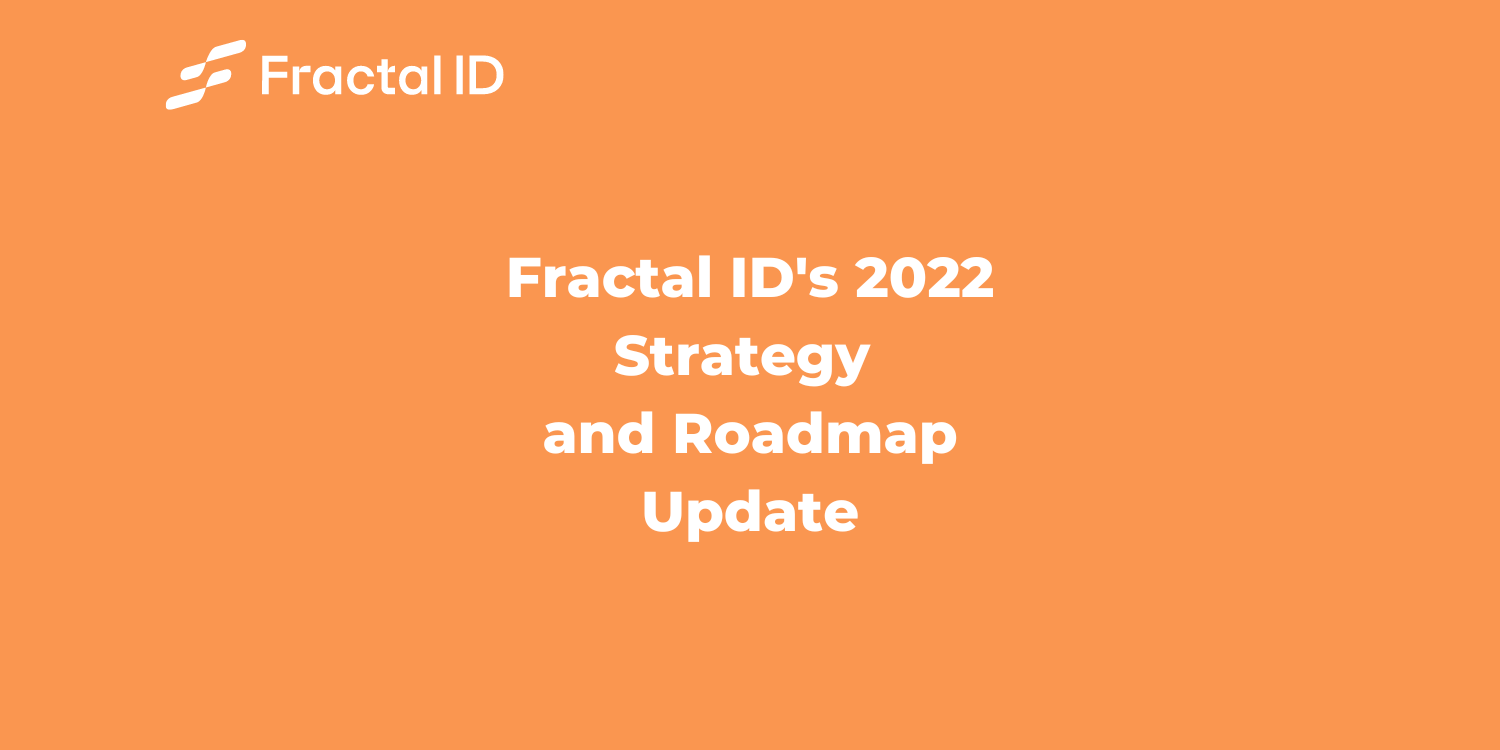There is no denying that 2021 was a year full of exciting developments. Yet we envision even greater progress for 2022 as we continue to increase the compatibility of our technology with the web3 market. Read on for an update on Fractal ID’s strategy and anticipated milestones for the coming year.
Keeping up the Momentum in 2022
2021 was a prolific year for Fractal ID. It saw multiple partnerships with key web3 players, including OCEAN Protocol, Outlier Ventures, Integritee, and the SINE Foundation. We launched the Fractal ID Protocol, Wallet, and Academy, oversaw successful staking and ambassador programs, and were awarded a web3 Foundation grant. By the end of the year, more than 600k users had signed up for Fractal ID.
The Fractal ID team has every intention of keeping up the momentum in 2022. We are funneling everything we’ve got towards putting data ownership and control back where it belongs: into the hands of the user (you), the data originators, and contributors. This means further development of all three core Fractal ID units: the Wallet, ID, and Protocol.
The vision behind Fractal ID’s efforts is that of restoring the balance of power and control between web platforms and their users. In the current instantiation of the web, platforms profit from the data you provide without giving you a fair return. Content creators and data originators provide the fuel that keeps the ecosystem running. Yet they enjoy neither an approximation of fair rewards nor control over their own contributions.
Fractal ID’s efforts aim to establish an equitable equilibrium amongst web providers and consumers. To achieve this aim, Fractal ID employs three interconnected strategies:
- Providing a fair alternative to the $400bn+ AdTech sector that only let’s large companies benefit from your data;
- Leveraging data sharing incentives by enabling payment functionality for the FCL token; and
- Providing the critical infrastructure for identity management in web3.
Each of these strategies symbolizes a piece in the larger puzzle. We are committed to realizing all three of them. Yet we have come to appreciate that our best shot at doing so involves wise and advanced planning.
The three strategies are not independent of each other. They interact in important ways. For example, providing a fair alternative to the current web2 structure where data owners cannot make profit off their data requires significant advances in identity management. Fractal ID aims to provide users with the ability to:
- Maintain ownership of their data via decentralized IDs.
- Selectively disclose verified data about themselves to chosen parties (e.g. to benefit from customized ads and promotions).
- Exchange their data with third parties (e.g. data aggregators, AdTech companies) for fair compensation.
We have decided to refocus our energy and resources on developing the critical identity management infrastructure for web3. Our vision is to create a web3-first, privacy-preserving verified identity infrastructure. We explain this vision as well as the change in strategy this implies for 2022 in detail below. But first, we emphasize that this is a strategic decisionconcerning how our overall aims are best realized: it is not a pivot or fundamental change of course. Our vision and end goal remain the same: level the playing field in the data economy to empower and incentivize both users and businesses to transparently share high-quality data.

The Fractal ID Multi-Chain Compatible DID Solution
Web3-first
Our identity management solutions will continue to increase compatibility with the web3 market. There are several reasons for this focus. The transparency and integrity of a public blockchain are a natural fit for decentralized identity management. Decentralization allows users to be self-sovereign, prevents data leaks, and ensures that records are available even if Fractal ID is temporarily down. Moreover, we are convinced that the blockchain sector is going to continue its course of hypergrowth. Companies working in this space also tend to be more innovative and open to novel solutions than incumbents.
Perhaps most importantly, web3 is in dire need of identity solutions. Orchestrating compliant project launches is a clunky process full of inefficiencies and hassles for both project teams and their supporters and users. DAOs and airdrops are vulnerable to Sybil attacks (multiple identities per user) which implies less effective and authentic governance as well as unfair token distributions. These are but a few examples of ways in which ineffective identity solutions limit the growth of the DeFi sector.
Privacy-preserving Verified Identity Infrastructure
Identity solutions need not necessarily follow a one-size-fits-all approach. To comply with certain regulations, a number of relying parties (clients) might not require the full spectrum of personal information. It can suffice for them to verify a credential rather than the data on which that credential is based. Moreover, this credential can be made much more specific and therefore privacy-preserving than the full KYC process we are so often made to suffer through.
For example, it may be enough to satisfy certain regulatory requirements that a client can prove that a specific user is based in a particular jurisdiction. To satisfy this requirement, all that might be necessary is a location credential while other sets of personal data may be considered strictly superfluous. Fractal ID enables privacy-preserving identity verification by issuing only the relevant credential. Fractal ID users may upload their personal data once only to the Fractal ID. Fractal ID then verifies this information and issues credentials based on this data. Clients can choose to have access only to these credentials; at no point are they privy to the underlying personal data.
Similarly, different clients will need different solutions for different purposes. Often, a simple proof of uniqueness is all that is required. In other cases, a basic ID check may be necessary to link a particular individual to an online identity. Finally, in certain instances, the full KYC/AML-compliant credential must be provided. There is no need to provide more credentials or data when less will do. Fractal ID can preserve privacy by only issuing the credentials strictly necessary for the task or use at hand.
Generic Cross-Chain Data Storage Technology
At heart, the Fractal ID protocol is aimed at enabling secure, rapid, and privacy-preserving data exchange. A key element of such an exchange is the ability to share information across chains.
For example, you might want to share your successful credit history from a Polkadot DeFi project with an ETH-based lender. Perhaps you wish to share the build of your computer with a computer parts shop to check for compatibility and upgrades. Or you might be asked to verify personal information for KYC purposes.
In each case, a mechanism to facilitate data exchange between different repositories or chains is required. Over the coming months, our focus will be on enabling applications across different chains to communicate and share data seamlessly with each other.
As part of this focus, we will be hosting events for developers to learn and experiment with this new framework. These include a DApp development hackathon with prizes for the best ideas as well as a Builder program aimed at establishing a community of developers excited about exploring the potential of our technology. If you are interested in these programs, make sure to stay updated by joining the announcements channel on Telegram.
Fractal ID and Fractal ID Protocol are two sides of the same coin. Both are in pursuit of our larger goal — being the prime mover within the next generation of the web in which data can be shared transparently and users remain in control. We can hardly wait to see all of the new tools and applications our partner developers will build on top of our technology!
Implications of the 2022 strategy
- Fractal ID Protocol and Fractal ID will join forces. Temporarily doubling down on identity management helps advance the goals of the Fractal ID Protocol, since identity management is crucial for the Protocol’s aim of incentivizing individual data contributors. Determining user uniqueness is necessary for a fair and efficient distribution of FCL incentives.
Previously, the Protocol and ID teams have operated separately. Over the coming year, the two teams will integrate, significantly increasing the expertise and manpower available for achieving the aim of providing key infrastructure for decentralized identity management. - Our new strategy is best realized using a different incentivization system than simply paying for data capture. The new strategy will involve incentives for staking and running additional code. We’ll have more details about that in the coming months.
In the short term, we’ll be reducing the portion of block rewards that go towards data capture. Those funds will now be routed into a development account and an incentivization account controlled by Fractal ID. Development account funds will be used for paying developers, funding hackathon rewards, and bounties for contributions. The incentivization account will be used to provide incentives for things Fractal ID believes in but which are difficult or inefficient to decentralize. - Postponing the FCL-ETH bridge. We are aware of how important it is to the community to be able to withdraw FCL tokens. For that reason, providing a FCL-ETH bridge and payment functionality for FCL tokens have always been critical priorities for us. We cannot emphasize enough how grateful we are for your patience in this respect. Nevertheless, focusing on completing the bridge at present would derail us from our core goal of becoming the backbone of the new data economy. Currently, the critical priority is demonstrating how the data exchange we are creating will function in the real world. That is why we need to provide users with support for seamless interaction with other projects in the crypto space. Although providing the first real web3 data exchange has always been our primary focus, achieving this goal requires tough prioritization and difficult decisions, such as delaying, for now, the release of the bridge.
One Fractal ID
Fractal ID consists of three units: Fractal ID, Fractal ID Wallet, and Fractal Protocol. Each of these units contributes in distinct but interrelated ways to Fractal ID’s overall mission.
Fractal ID is a KYC (‘Know Your Customer’) and AML (Anti-Money Laundering) service platform which provides fast and accurate verifications to meet regulatory standards. Fractal ID allows businesses to outsource part of their regulatory compliance needs without compromising on transparency and integrity. All sensitive data are encrypted and subject to state-of-the-art security processes.
Fractal Wallet allows users of Fractal ID to manage their KYC credentials. Users upload the information they are required to verify for KYC/AML purposes, such as proof of residence or passport photos, to their Fractal ID Wallet, where it is verified, encrypted, and stored securely. Whenever a user is required to verify their information — for example to take part in an IDO — they can then use their Fractal ID Wallet to issue the relevant credentials seamlessly, securely, and instantaneously, as opposed to sharing the underlying data and waiting for whatever KYC/AML processes are put in place by the platform or project they are seeking to participate in. This allows for a KYC/AML process as easy as connecting a cryptocurrency wallet to a website or exchange.
Fractal ID Protocol provides incentives for growing the decentralized data commons by rewarding data originators, contributors, and consumers with value in the form of the FCL token. Fractal ID Protocol enables users, individuals to control who has access to their data, for which purposes, and under which conditions. It allows users to reap the just rewards for providing access to the data that fuels the ecosystem. For example, Fractal ID Protocol users can be rewarded in FCL tokens for allowing clients to use de-identified, abstracted versions of their data.
Importantly, these three units form a cohesive whole and work in unison towards realizing Fractal ID ’s vision of a data and identity infrastructure in which control and ownership over data remain in the hands of its originators. Whether we work on advancing the implementation of the ID, Wallet, or Protocol, we are One Fractal ID.
